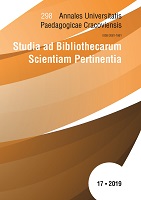Baťa’s Zlín and literature: art and media at the service… of progress and as a service to progress
Baťa’s Zlín and literature: art and media at the service… of progress and as a service to progress
Author(s): Barbora SvobodováSubject(s): Cultural history, Media studies, Architecture, Visual Arts, Social history, Pre-WW I & WW I (1900 -1919), Interwar Period (1920 - 1939), WW II and following years (1940 - 1949), Sociology of Art, History of Art
Published by: Wydawnictwo Uniwersytetu Komisji Edukacji Narodowej w Krakowie
Keywords: Baťa; Culture; industry and media; Czechoslovakia 1918–1945; modernism and avantgarde;
Summary/Abstract: Baťa’s Zlín represents a complex phenomenon that cannot be reduced to the business sphere only. It was, in essence, a modernist avant-garde project unique for its kind in the context of Central Europe in the first half of the 20th century. The Baťa shoemaking company very much influenced and determined nearly all of the events in this East Moravian town and the whole region itself, and it also had an idea of the forms and functions of artistic production. While in the field of architecture, urbanism and design, progressive artistic tendencies were strongly applied in the spirit of corporate philosophy, Baťa’s taste in literature was, as it appeared on the pages of the company periodicals Sdělení and later in Zlín and in the production of publishing house Tisk Zlín, very conservative. Baťa encouraged his employees to develop reading literacy and self-study, founded a company library, but at the same time, books were considered in a sense of Czech National Revival as a means of educating, teaching, and cultivating workers. Literary works were to communicate clearly understandable and positive messages; on the other hand, they were also supposed to entertain the readers and enable them to relax. Within the framework of the main newspapers published by the company, the Literary Patrol section with the recommendation of specific titles was included from the beginning, and also examples of fiction and non-literary texts were published in Baťa’s press together with excerpts from manuals devoted to personal development. Especially in later years, much space was devoted to travel reports. In the mid-1920s, the company acquired a publishing and bookkeeping concession and began publishing its own publications. During the relatively short period of time, despite repeated calls the authors who would start creating Baťa bestsellers were nowhere to be found. Even J. A. Baťa appealed to writers to do this in his speech at the Writers’ Congress held in Zlín in 1936, and he also tried to motivate them by having the company began to award literary and journalist prizes. But few original books could meet Bata’s literary demands, and today we can only speculate how the situation would have developed if it had not been violently interrupted by historical events.
Journal: Annales Universitatis Cracoviensis. Studia ad Bibliothecarum Scientiam Pertinentia
- Issue Year: 2019
- Issue No: 17
- Page Range: 178-191
- Page Count: 14
- Language: English

